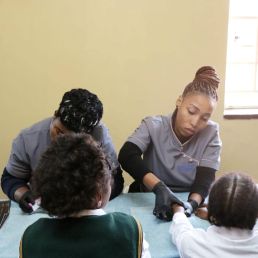What’s Your Hug Worth – The Power of Physical Touch

Physical touch is an essential experience in the lives of all human beings. Physical touch and/or the lack of it triggers responses from the brain, in turn altering our biological responses, thinking and feeling processes – and then ultimately affecting our behaviour. The lack of such demonstrations of care, warmth, love and safety are not only detrimental to childhood development and attachment, but continue to impact negatively on a healthy sense of well-being and development into adulthood.
Research has helped us to understand the significance of touch. Healthy, caring moderate to firm touch positively stimulates the body’s receptors from the largest organ, the skin, to the systems within the body – gastric, vocal, heart, etc. Positive moderate to firm touch experiences shifts the brains production and releases chemicals or hormones into the body, where it:
- decreases stress chemical (cortisol) releases, thus strengthening the immune system by saving natural killer cells that kill viral, bacterial and killer cells;
- has an effect on the release of both a hormone fundamental to influencing our social behaviour (oxytocin) and the brain’s reward system (dopamine);
- increases anti-depressant and anti-pain (serotonin) chemicals and so connected to our feeling levels of joy, happiness and well-being.
Interesting to note that light touch does not have the same positive impact as a moderate to firm touch (Dr T. Fields). Following moderate to firm touch, brain wave analysis shows an increase in theta waves, typically associated with relaxation, with a calming effect on the nervous system as heart rate and blood pressure levels decrease. Light touch results in an increase in brain beta waves, typically associated with arousal, resulting in an increase in blood pressure and heart rate.
Outcomes from ‘Lack of Touch’ studies, at and from infancy, showed adverse effects on behaviour and emotion including eating difficulties, excessive crying, hostile aggression, withdrawal and/or shyness or stubbornness. These outcomes have also indicated that lack of touch can lead to significant physical development and growth delays.
Thus, a caring, loving hug can serve to enhance the child or person’s sense of well-being and sense and feeling of comfort and safety, calm the nervous system by reducing heart rate and blood pressure, strengthen immunity, alleviate anxiety and stress and assist with stabilising mental health anxieties, wellbeing and trust.
The lack of that critical hug can find that child or person’s immune system debilitated or compromised, mental health compromised with aggravated depression and/or withdrawal and, according to Professor McGlone, with the brains reward system depleted the individual might be driven to search for inappropriate replications to fill that reward void including drugs, alcohol or food.
When left alone and lonely, the hug of a soft toyed teddy can help to ease negative emotions (Dr Jon Reeves) – but a hug from a caring and trusted human being is beyond any measurable monetary value – and can literally change feelings, experiences and lives.
What is your hug worth?
Disclaimer: Girls & Boys Town South Africa has been complying with government legislation to implementing an appropriate, holistic youth- and staff-centred response framework. This enables them to protect their health and prevent and manage COVID-19 infections within their ten sites.












